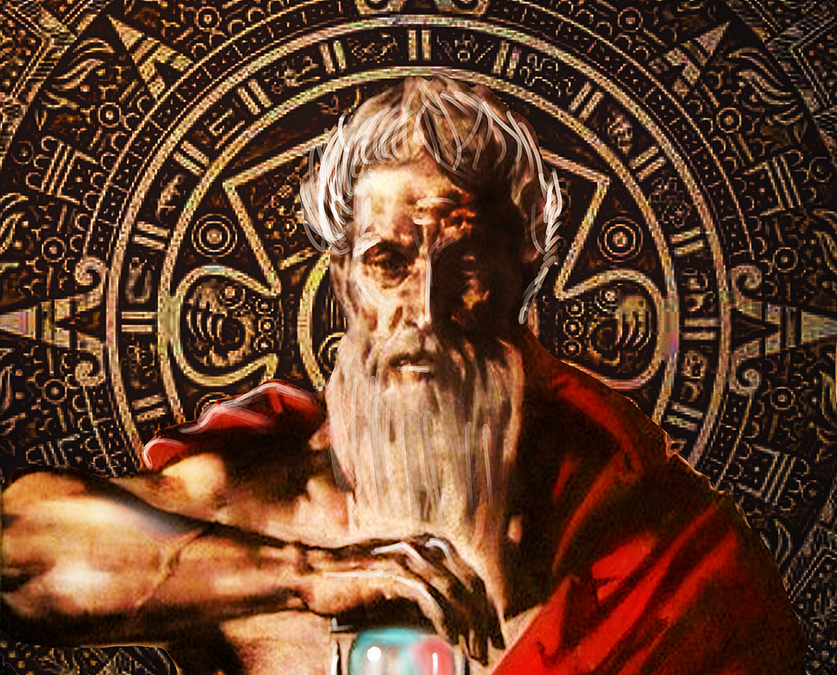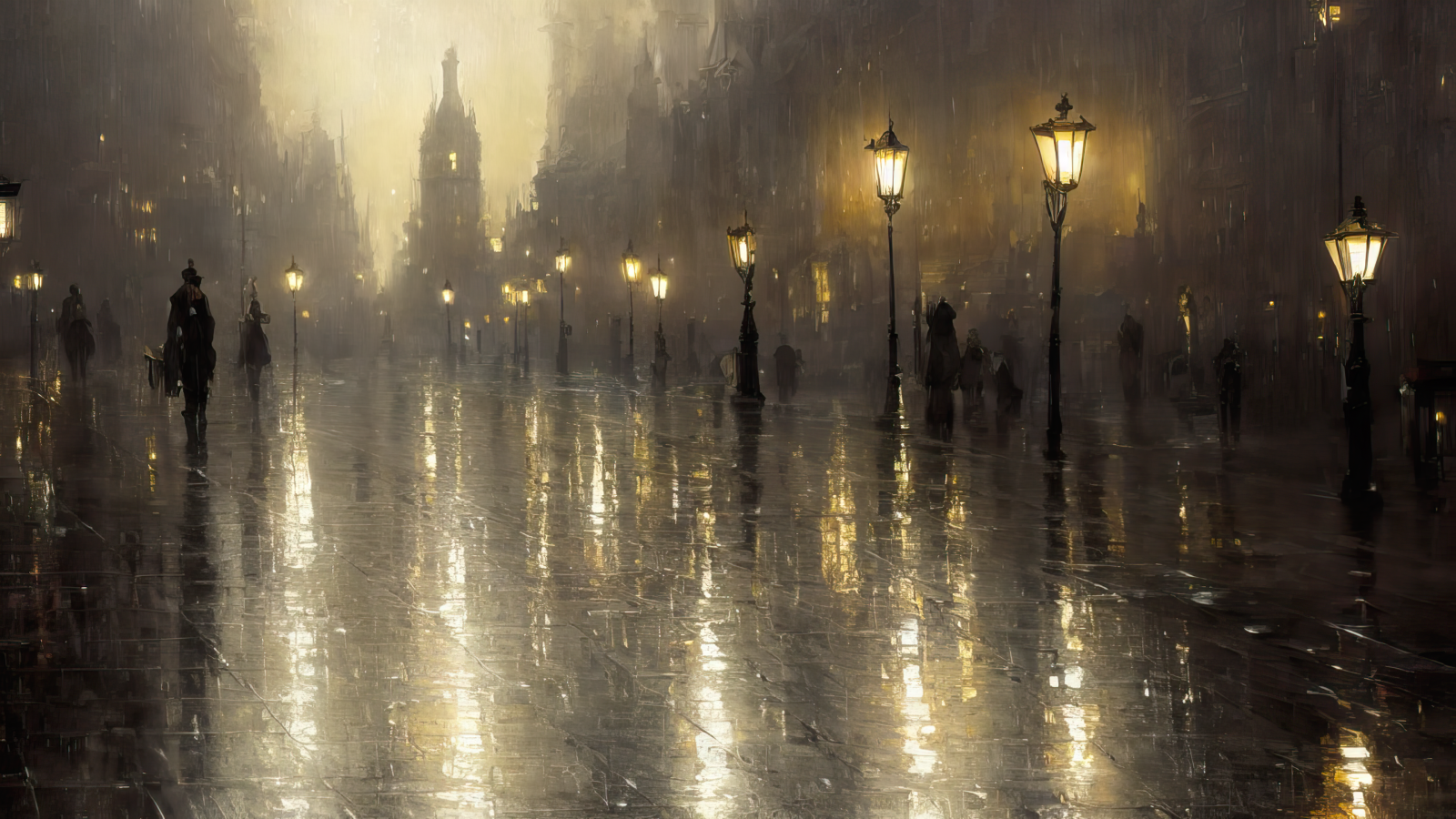Our life in the conditioned realm is all about one thing and one thing only – it’s all about faithfully reproducing (or replicating) that realm over and over again, without ever stopping to look at what we’re actually doing. We might imagine that what we’re doing is that we’re ‘living our lives, that we’re ‘doing our own thing’ (whatever that might be), but the truth is that we’re not living our lives at all. We’re not living life, we’re living the system’s version of our life, which means that we’re ‘living the system,’ not life. We’re not ‘doing our thing’, we’re doing the thing that has been given to us to do. We’re performing a mechanical function. The system isn’t really something we can live, after all – it isn’t expansive enough for that, it isn’t a world at all when it comes down to it but only a dry procedure (or protocol) that we are obliged to keep on repeating. It’s too sterile, too stuffy, too frighteningly repetitive to be called ‘life’.
A world is genuinely spacious, we might say, and so we can be playful within it – we can be spontaneous within it instead of just keeping ourselves busy by enacting sterile protocols. We can explore a genuinely spacious world in an open way, in a way that has no absolutely agenda to it; a procedure – on the other hand – has no space in it whatsoever. A ‘procedural’ space has no space in it for anything that isn’t the procedure; it has no space for creativity (or ‘free flowing’) and so all we can ever do is to keep on mechanically enacting the ‘prescribed steps’, the steps that have been officially approved of. All we can ever do is to ‘keep on obeying the rules’, so that we don’t ever wander off track, so that we don’t ever ‘see anything that we’re not supposed to see’. We can’t not obey rules because rules are all we know; the world that is made up of rules is all we know so where else are we going to go? What else are we going to do? Not following the path that has been set out for us by some external authority just isn’t a ‘thing’ for us. We don’t miss ‘the absence of radical freedom’ because we don’t know that there is such a thing in the first place – the possibility of radical freedom is a possibility that we just can’t relate to.
This is all a matter of how much perspective we have – whether we can (or cannot) appreciate that there is this astonishing possibility of ‘radical freedom’ is purely a matter of perspective. If we had the necessary perspective then we’d see that our allegiance to the map, to the theory, to the protocol, etc., is our way of excluding any awareness of actual reality (which has nothing to do with our chosen viewpoint, nothing to do with what our thoughts on the matter might be). If we were interested in what unmanipulated reality looks like then we’d happily renounce all our allegiances to this view or that view, to this theory or that theory and – instead – we’d relate to the world directly. If we wanted to see the ‘unspun truth’ (whatever that might look like) then all that would be needed would be us to ditch our historic allegiances. If we had any genuine interest in seeing through the conditioned reality (which equals ‘our own biases reflected back at us’) then we would relinquish our blind loyalty to the past (which, it seems, is simply too high a price for us to pay). As a rule therefore, we could say that ‘loyalty trumps honesty’, and there are very few exceptions to this. The truth comes nowhere in our list of priorities – it simply doesn’t figure. We have no shortness of loyalty to our ridiculous ten-a-penny fictions, we might say, and none at all to the truth…
Another way of putting this is to say that we are ‘the slaves of our past’. We generally frame this slavery in terms of ‘preserving values’ or ‘being faithful to sacred traditions’ or something like that but – in reality – it’s just inertia we’re dealing with here – it’s just the dead momentum of the past. It sounds good when we pontificate about ‘values’ and ‘traditions that are rooted in the past’, but the thing about this is that what we call ‘the past’ isn’t the past at all, not in the objective sense that we mean it. What we are referring to as ‘the past’ is actually the back-projection of where we are now. As Alan Watts says, it’s as if we’re on an ocean-going ship, standing at the stern, looking back at the wake. We might think that our wake – which is to say, our past – is what has caused us, given rise to us, whilst in reality – as Alan Watts says – it is us that has given rise to the wake.
When we look back at the past then we do so with the eyes of the present and so what we’re doing is that we’re constructing the past in terms of however we happen to be seeing things at the moment. Were we to change our way of looking then we would change our so-called ‘past’. Events aren’t experienced ‘as they are in themselves’ (we might say), they are experienced in terms of a very narrow set of evaluative criteria. The past is my own personal interpretation just as the present is; all we have is our way of interpreting things and that ‘way’ could equally well be any way – it’s not written in concrete, it’s not etched in stone. It could equally well be ‘anything at all’ but once it has been adopted then it becomes this terribly rigid thing that we are calling ‘the sacred tradition’ (or ‘the precious values of the past’). It’s no such thing however – it’s simply ‘our own personal way of interpreting stuff’, it’s simply ‘a viewpoint that we have freely chosen (out of an infinity of other possible viewpoints) reflected back at us as the one and only way of seeing things. What starts off ‘as broad as broad can be’ ends up ‘as narrow as narrow can be’ – we start off in a wide-open field and end up in a tunnel that’s so narrow, so constrictive, that we can’t even turn around anymore.
What we’re looking at here is essentially a way of stabilising (or solidifying) our very ephemeral viewpoint, therefore. This is the ‘tried and trusted mechanism’ that we use on a daily basis to protect ourselves against the awareness of the essential relativity of all things. This is how we ‘defend ourselves against eternity’, so to speak; this is how we protect ourselves against the ‘incomprehensible onslaught of the Infinite’. We can talk about having ‘an awareness of the essential relativity of all things’ but this isn’t some special type of awareness, it’s just awareness. All awareness is ‘awareness of the relativity of all things’. If we don’t have a keen sense of the relativity of everything then we’re simply not aware; if we’re not conscious of the infinite relativity of every possible statement that we could possibly make about the world then we are ‘disconnected from reality’.
Instead of being conscious – which is the ‘open state of being’ – we have conditioned consciousness, which is ‘consciousness that is subject to rules’ (or, as we could also say, ‘consciousness that has come to us in some sort of preformatted mode’). ‘Consciousness’ and ‘the conditioned analogue thereof’ aren’t just ‘two different things’, they are properly antithetical to each other. They are ‘chalk and cheese’. When we’re conscious then we have nothing to hold onto, we have no established viewpoint; we in fact don’t have any viewpoint at all. This is the situation that Krishnamurti refers to as ‘having no centre’. We don’t have a reference point to bring everything back to, which means that everything we see is new, unprecedented, without parallel, etc. As the often-repeated Frank Zappa quote goes, “A mind is like a parachute. It doesn’t work unless it’s open.” Bringing in a slightly different terminology here, we could modify this statement to say that ‘consciousness is like a parachute, which can’t function if it isn’t open’. The analogue of consciousness is the rational mind, which is – we might say – ‘the mechanical version of it’ (i.e., the version which runs entirely on rules, entirely on precedence) …
The rule-based rational mind doesn’t observe the world, it interprets it, it interprets it in strict accordance with its chosen viewpoint; everything gets ‘squeezed through the same aperture’ and – as a result – everything IS that aperture. When we are provided with the cognitive aperture to look through then we’re provided with ‘the view that comes about a result of using it’ and – crucially –there’s nothing in the view that isn’t already in the viewpoint. There’s nothing in conditioned existence that hasn’t already been spelled out in advance by the conditioning. ‘The thinker’ and ‘the thought that the thinker thinks’ are the same thing, ‘the doer’ and ‘what the doer does’ are the same thing; ‘the observer’ and ‘what the observer observes’ are the same thing and what this means is simply that there is no observation going on – what we are calling ‘conditioned perception’ is simply ‘the system agreeing with itself’, in other words. It’s the system of thought doing what it always does –agreeing unreservedly with its own biases.
What we’re calling ‘conditioned consciousness’ is nothing more than a continuous act of self-agreement, therefore – this is all there is to it and anything further we may wish to say on the subject of ‘conditioned consciousness’ is simply obscuring the perfect clarity of this understanding. By reading anything else into this situation we are only confusing the hell out of ourselves – if we can see that the conditioned mind and the worlds it creates always comes down to this act of self-reference (this act of agreeing with our mind’s arbitrary map of the world) then this is all we need to know. That’s everything we need to know right there – nothing else needs to be said. An illusion is ‘something that seems to exist but doesn’t’ and there’s no point in making too big a meal out of it; when we agree with ourselves about what reality is then that isn’t reality, it’s a game…
The reason we can say that conditioned existence is the type of existence where we are ‘the slaves of the past’ is because when thought loops back on itself a fixed template (or standard) is created that determines what is to be seen as ‘important’ or not important, what is to be acknowledged as real and what is not to be so acknowledged. On the one hand we can say that this constant ‘looping back to the template to check everything against it’ allows us to make sense of the world (and thus operate effectively within it), but – on the other hand – we can also point out that this ‘looping’ business means we are chained to the past so that all we can ever do is to reiterate that past on an ongoing basis. Instead of gracefully letting go of the past and then ‘moving on’ – which is the healthy thing to do, we might say – we get stuck and end up repeating the same scenario with only superficial differences, with no end in sight. We avoid the radical uncertainty of the present moment by continually ‘rehashing’ (or ‘recycling’) what we wrongly understand to be ‘the past’.
The aim behind Conservative Mode – we might say – is to avoid the essential challenge in life, which is change. Change is a risk because what we don’t know what is going to happen next, and we get around this risk by creating an analogue of life in which we can change, in which we can move on. We get around the risk by creating an analogue of reality within which we absolutely can know ‘what is going to happen next’. We refuse point blank to ‘live life on its own terms’ and rather than surrendering to the incomprehensible flow of life (which is what David Bohm calls the Holomovement, James Carse calls the Infinite Game, and the Daoists call the Dao) we play a finite game instead. Rather than engaging open-endedly in life (and taking the risk that comes with this) we stick to playing our own little game instead, which is ‘the game of conditioned existence’.
Image credit – geeky-gadgets.com






